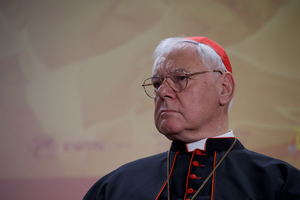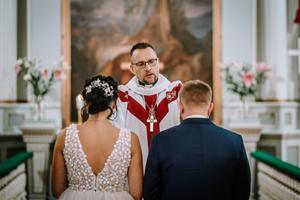Francis to Make First-Ever Papal Apostolic Voyage to Arabian Peninsula
Feb. 3-5 trip to the United Arab Emirates will provide gauge of regional relations between Muslims and Christians.

VATICAN CITY — As the first-ever apostolic voyage by a pope to the Arabian Peninsula, Pope Francis’ visit to the United Arab Emirates will not only be historic; it will also serve as an indicator of improving relations between Muslims and Christians in the region, including a possible breakthrough in religious freedom in neighboring Saudi Arabia.
The Feb. 3-5 trip to the UAE’s capital, Abu Dhabi — Francis’ 26th journey outside Italy and his sixth visit to a Muslim-majority nation — is part of the Holy Father’s continual outreach to the Muslim world, undertaken due to “difficulties” between Christianity and Islam that “derive from the tragedies of terrorism and religious fundamentalism,” according to Cardinal Pietro Parolin, the Vatican secretary of state.
The Pope’s program for the three-day visit will include an interfaith meeting at Abu Dhabi’s Grand Mosque of Sheikh Zayed, attended by the grand imam of the Al-Azhar University; a large open-air Mass in Abu Dhabi’s Zayed Sports City stadium, at which around 120,000 faithful are expected, making it the largest crowd ever to assemble since the UAE was founded in 1971; and a private visit to the city’s St. Joseph’s Cathedral.
The Pope has said this visit, and his trip to Morocco at the end of March, are “important opportunities” to advance Catholic-Muslim dialogue during the 800th anniversary of the historic meeting between St. Francis of Assisi and Sultan al-Malik al-Kamil. The Church’s theme for the visit, “Make Me a Channel of Your Peace,” taken from the famous prayer attributed to St. Francis, is the “Pope’s intention in going to the Arab country,” the Vatican has said.
But it also comes at a particularly pivotal time for the Arab world, as the region continues to modernize and become a key global player, both economically and politically.
The Gulf states, especially since the rise of Islamist violence, have made a point of striving for tolerance, with the UAE having a minister dedicated to the cause. Observers say they have been almost competing with each other to see who can be the most tolerant, with some, such as the UAE, Bahrain and Qatar, issuing invitations for a papal visit and currying favor with the Vatican for at least the past decade.
Christian Foreign Workers
This emphasis on tolerance is not only aimed at conveying a safe and stable environment to attract economic investment, but also because the Gulf states now depend heavily on foreign workers, many of whom are Christian.
According to UAE government figures, around 1 million Christians live in the emirates, out of the total population of 9.5 million, and 70%-75% of them are Catholics from Asia (India and the Philippines), with the remainder coming from the Americas, Africa, the Middle East and Europe.
Most of them provide domestic help or are employed — often in relatively squalid conditions with little pay — as laborers on the vast construction projects in Dubai and elsewhere. Without their sacrifices, many concede that the Gulf states would not have achieved the rapid economic expansion of the past two decades.
“Our momentum toward being a tolerant, peaceful and prosperous society is well established,” said Sheikh Nahyan bin Mubarak Al Nahyan, the UAE’s minister of tolerance, in a message released soon after the papal visit was announced. “We are better for knowing all the different others.” Al Nahyan believes the Pope’s visit will inspire the UAE to “redouble” efforts “to nurture tolerance” and observed that the trip will coincide with the UAE’s “Year of Tolerance” taking place in 2019.
Religious freedom already exists formally in the emirates — a federation of seven principalities along the Persian Gulf coast, each ruled by a separate hereditary dynasty — and free land is often given to build churches, but overt proselytism and conversion from Islam remain strictly forbidden.
Those restrictions are unlikely to be tackled on this trip, according to informed sources, although some announcement relating to greater benefits for the faithful is expected. This is believed more likely to come from the Vatican than the UAE and may include the appointment of another bishop to help aid the burgeoning number of Catholic immigrants in the country (currently one bishop, Paul Hinder, has jurisdiction over UAE, Oman and Yemen as apos-tolic vicar of Southern Arabia, while the apostolic vicar for Northern Arabia, Bishop Camillo Ballin, cares for the faithful in Kuwait, Bahrain, Qatar and Saudi Arabia).
Wider Impact?
But some believe the Pope’s visit could have an impact beyond the UAE and, crucially, help foster religious freedom within Saudi Arabia. The Saudi kingdom, which continues to place severe restrictions on the faith and forbids churches in the territory, has embarked on a modernization program that has included a series of overtures to Christians.
Last April, the late Cardinal Jean-Louis Tauran, the Vatican’s former head of interreligious dialogue, traveled to Riyadh for a historic meeting with King Salman bin Abdulaziz Al Saud; a few months earlier, Maronite Patriarch Beshara al-Rai visited the country. The UAE, being Saudi Arabia’s closest political and military ally, probably consulted Riyadh before taking the historic decision to receive the Pope.
Whatever its wider implications, both the faithful and the region’s Muslim leaders are hopeful this “momentous milestone in the region,” as UAE Foreign Minister Anwar Gargash has called it, bears the fruit of peaceful coexistence.
“These visits are significant for both Muslims and Christians, as we must learn to coexist,” Bishop Hinder told the Register Jan. 8. “In our world of migration, human beings have to learn to live together, whether Christians among Muslims, or Muslims among Christians, and even both Muslims and Christians among nonbelievers and among other big religions. We have to create a tolerant world for the younger generation.”


















